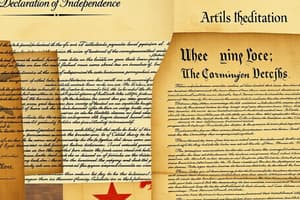Podcast
Questions and Answers
What does the proletariat primarily own according to Marxist theory?
What does the proletariat primarily own according to Marxist theory?
- Their labor force (correct)
- Capital assets such as stocks and bonds
- Land and property
- Ownership in factories
What is considered the first step of the Proletarian Revolution?
What is considered the first step of the Proletarian Revolution?
- Overthrowing the bourgeoisie
- Establishing a new government
- Abolition of bourgeois property (correct)
- Creation of new economic systems
According to Marxist theory, what leads to the alienation of workers during the Industrial Revolution?
According to Marxist theory, what leads to the alienation of workers during the Industrial Revolution?
- Reduction of working hours
- Increased demand for skilled labor
- Workers' connection to their communities
- Ownership of production means by the bourgeoisie (correct)
What is the anticipated outcome following the defeat of capitalism according to Marxist theory?
What is the anticipated outcome following the defeat of capitalism according to Marxist theory?
What does the term 'class struggle' represent in Marxist theory?
What does the term 'class struggle' represent in Marxist theory?
What was one of the main goals of the Declaration of Independence?
What was one of the main goals of the Declaration of Independence?
Which principle allows the president to check the power of Congress?
Which principle allows the president to check the power of Congress?
What does the phrase 'every man is created equal' represent in the Declaration of Independence?
What does the phrase 'every man is created equal' represent in the Declaration of Independence?
What was one outcome of the Emancipation Proclamation?
What was one outcome of the Emancipation Proclamation?
What characterized the agricultural system in the Southern states during the pre-Civil War era?
What characterized the agricultural system in the Southern states during the pre-Civil War era?
Which of the following was NOT a characteristic of the slave system in the American South?
Which of the following was NOT a characteristic of the slave system in the American South?
Why did the Northern states want protection through tariffs?
Why did the Northern states want protection through tariffs?
Which action can Congress take to check the power of the President?
Which action can Congress take to check the power of the President?
Flashcards
Proletariat
Proletariat
The working class, who own only their labor power and must sell it to capitalists for survival.
Bourgeoisie
Bourgeoisie
The capitalist class, who own the means of production and profit from exploiting the labor of the proletariat.
Surplus Value
Surplus Value
The difference between the value of the goods produced by workers and the wages paid to them, which is kept by the capitalists.
Alienation
Alienation
Signup and view all the flashcards
Class Struggle
Class Struggle
Signup and view all the flashcards
Declaration of Independence: Audience
Declaration of Independence: Audience
Signup and view all the flashcards
Declaration of Independence: Goals
Declaration of Independence: Goals
Signup and view all the flashcards
Declaration of Independence: Justification
Declaration of Independence: Justification
Signup and view all the flashcards
US Constitution: Separation of Powers
US Constitution: Separation of Powers
Signup and view all the flashcards
US Constitution: Checks and Balances
US Constitution: Checks and Balances
Signup and view all the flashcards
Slave System in the American South: Characteristics
Slave System in the American South: Characteristics
Signup and view all the flashcards
Emancipation Proclamation: Lincoln's Reasons
Emancipation Proclamation: Lincoln's Reasons
Signup and view all the flashcards
Causes of the American Civil War
Causes of the American Civil War
Signup and view all the flashcards
Study Notes
Declaration of Independence
- Addressed to the British government and people, and potentially other nations.
- Goals: Declare independence from Britain and establish the United States of America, with the power to wage war, make peace, form alliances, and conduct trade.
- Reasons for declaration: Citizen's right to abolish abusive governments, colonist's unsuccessful requests for change from British King, declaration of inherent human rights (life, liberty, pursuit of happiness).
US Constitution
- Separation of Powers: Divides governmental power among three branches (legislative, executive, judicial).
- Powerful President: Commander-in-chief of the armed forces.
- Checks and Balances: System of mutual limitations on governmental power.
- President can veto legislation, appoint Supreme Court judges.
- Supreme Court can rule laws unconstitutional, rule against presidential actions.
- Congress can impeach and remove president, override vetoes.
Slave System in the American South
- Characterized by a complex mix of affection, feelings of superiority, and cruelty among slave owners.
- Excessive violence, torture inflicted upon slaves.
- Runaway slaves sought refuge in Northern states or Canada.
- Frequent rape of female slaves, and child labor among slaves.
Emancipation Proclamation
- Lincoln signed to preserve the Union (USA).
- Utilized former slaves in the Union army.
- Provided a moral justification for the Union cause.
- Avoided external intervention on the Southern states' side.
Causes of the American Civil War
- North-South Differences: Key factors involved differences between how society functioned in the North vs the South
- North: Industrialized, non-slave labor, immigrant workers, sought tariff protection.
- South: Agricultural (cotton, tobacco). Relied on slave labor for their economies. Sought open trade.
Chronological Order of Events
- 1607: Jamestown founded.
- 1776: Declaration of Independence.
- 1787: US Constitution adopted.
- 1861-1865: Civil War.
- 1863: Emancipation Proclamation.
Marxist Theory
- Exploitation of Labor: Capitalists profit from worker's labor.
- Internationalism: Communist movement must be global.
- Class Struggle: Constant conflict between proletariat and bourgeoisie.
- Communist Manifesto: Defines and establishes the communist ideology.
- Alienation: Workers separated from production and product.
- Abolition of Bourgeois Property: First step in proletarian revolution.
- Inevitability of Revolution: A consequence of social conditions.
- Classless Society: Future of a society with shared land, industry, and wealth.
Studying That Suits You
Use AI to generate personalized quizzes and flashcards to suit your learning preferences.




